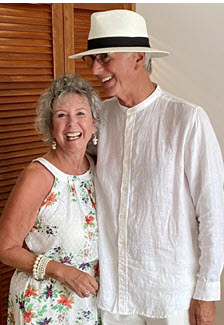SARASOTA, Fla. (April 4, 2024) – Nearly one in 10 Americans are living with chronic back pain so serious it impacts their ability to perform everyday activities. Many opt against surgery, fearing large incisions and long recovery times associated with many traditional procedures.
But the benefits of robotic and minimally invasive surgical techniques are now allowing Sarasota Memorial Hospital (SMH) spine surgeons to repair a wide range of spine conditions through key-hole incisions, and giving patients with debilitating back pain more options than ever before.
“A decade ago, minimally invasive techniques were used sparingly because of the spine’s close proximity to critical nerve and vascular structures,” said Sasha Vaziri, MD, a fellowship-trained neurosurgeon who has helped bring the latest advances in minimally invasive spine surgery to SMH and the Suncoast community. “The technology has come a long way, especially in the last few years. Today’s tools and technologies give us the precision, visualization and flexibility to address a much wider range of diseases and disorders through tiny incisions instead of one large opening, and that leads to less pain and downtime for our patients."
Although not everyone is a candidate, minimally invasive options are available to surgically repair herniated discs, synovial cysts, lumbar stenosis and other complex conditions of the spine. Compared to traditional open surgery, minimally invasive techniques offer many advantages, including:
- Shorter hospital stays
- Faster recovery
- Less damage to surrounding tissue
- Lower risks of infection and complications

Just ask Holly Bryan, a retired clinician from Maine who moved to Venice seven years ago. She underwent minimally invasive spine surgery at SMH-Sarasota in October 2023 after a painful cyst the size of a pea developed between the L4 and L5 vertebrae. She tried pain medication, injections and physical therapy first, but said the pain worsened and quickly sidelined her from every activity she loved – pickle ball, hiking and leisure activities with friends and family, to name a few.
“I was a complete invalid,” she said. “Every minute of every day was a struggle. When I was referred to Dr. Vaziri and he recommended a minimally invasive approach, I did not hesitate.”
Dr. Vaziri used the recently FDA-cleared Teligen system to decompress the affected nerves and provide stability to Holly’s spine. Like endoscopic procedures, the Teligen system allows surgeons to operate through a small tube using specialized tools, but with a multidirectional camera that provides a larger, clearer field of view. The advanced technology allows surgeons greater visibility and maneuverability to perform complex spine procedures through 1/4- to 1/2-inch sized incisions, which in Holly's case, dramatically reduced her recovery time.
She was discharged from the hospital the next day and within weeks was once again enjoying her active lifestyle. But the biggest gift, she said, was getting Dr. Vaziri's green light to attend her stepson’s wedding in Jamaica just weeks after surgery.
“I was 6 weeks post-op and had to take it easy, but it was a wonderful trip and practically pain-free,” she recalled. “Now life is wonderful. I am enjoying long walks with my husband and our dog, going out with friends and even playing pickleball again, a little more carefully."
This summer, she and her husband are planning a river cruise to Europe with light hiking in Switzerland, another trip she said that seemed impossible just six months ago.
A podcast interview with Dr. Vaziri is available here:
Minimally Invasive Spine Surgery | HealthCasts Season 6, Episode 5 from SMHCS on Vimeo.
About Sarasota Memorial Health Care System
Sarasota Memorial Health Care System is a regional health system offering Southwest Florida’s greatest breadth and depth of care, with more than 10,000 employees and 1.5 million patient visits each year across its two hospital campuses, freestanding ER, skilled nursing and rehabilitation center, cancer institute, behavioral health pavilion and regional network of outpatient/urgent care centers and physician practices. For information, visit smh.com.